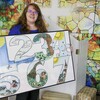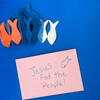In a parking lot I recently witnessed a car and a pickup roll toward the same parking space. Both were obviously determined to seize it. A grizzly mountain man rolled down his window in his one-ton pickup. Then an Ivanna Trump look-alike rolled down the window of her white Cadillac.
I rolled down my window too. (It was sanctified eavesdropping since I knew it would make a juicy illustration for this article.)
The man hollered, “Back it off, lady! I was here first.”
“Tough luck, fellow. You’re coming in from the wrong direction. You can’t do that.”
“%#&*@!”
“The rule is the car to the stall first gets to park there. I was here first, so beat it!”
“But my truck’s bigger. Forget your rules.”
The lady pulled forward an inch. The mountain man pulled forward an inch. The lady got an inch closer. The mountain man pulled closer. Their bumpers were literally touching, and both refused to budge.
Finally I pulled away to park three spaces down from their feud where there were dozens of open spaces. Talk about wise and otherwise! I’d file the hostile drivers in the latter category.
James, the half-brother of Jesus, offers us this insight on wisdom: “Who is wise and understanding among you? Let him show it by his good life, by deeds done in the humility that comes from wisdom. … Wisdom that comes from heaven is first of all pure; then peace loving, considerate, submissive, full of mercy and good fruit …” (James 3:13, 17). I’m not sure there was a lot of “wisdom that comes from heaven” going down in the parking lot that day.
What is wisdom? Doug Larson claims, “Wisdom is the quality that keeps you from getting into situations where you need it.” Pastor Bill Hybels defines it this way: “Wisdom is what is true and right combined with good judgment. Other words that fit under the umbrella of the biblical concept of wisdom are discerning, judicious, prudent and sensible. Not very glamorous words, perhaps, but words you can build a life on” (Making Life Work, 16–17).
That’s what I’m interested in—words that I can build a life on. Sitting in the classroom is not enough. You may get an education that way, but you could miss a life of wisdom. While I’m a staunch believer in formal, Adventist education (I have six diplomas from Adventist schools, and I work on a university campus where education is esteemed right up there with life, liberty and the pursuit of quicker jelling Jello), I see the limits of our Adventist schools—that is, if graduates don’t leave with a hefty dose of wisdom.
I suspect Ralph Waldo Emerson had it right when he observed, “The things taught in schools and colleges are not an education, but the means to an education.” After all, if you get a college degree but you can’t share a 50-acre parking lot with another shopper, how smart are you, really?





